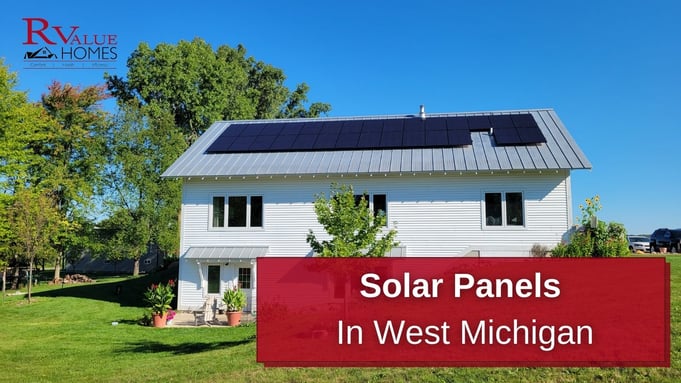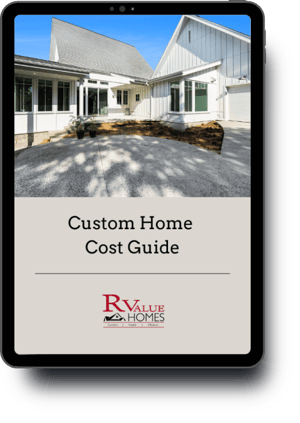4 Min Read
Do Solar Panels Work in West Michigan?
Whether you are environmentally conscious or simply looking to save money on your energy bills, solar energy can benefit your home under the right circumstances. Learn about the drawbacks and benefits of including solar panels in your custom energy-efficient home in Michigan. We want you to have the information you need to make the right choice for your circumstances. Solar panels can be a great investment, but they aren’t right for every client or every home.

R Value Homes is a West Michigan home builder based in Grand Rapids. We specialize in insulated concrete forms (ICF), passive solar, heat pumps, and solar panels; and we are passionate about helping homeowners reduce their environmental impact and save money on energy costs.
Solar Panel Vocabulary
Solar panel vocabulary includes several terms related to the technology and installation of solar panels.
Photovoltaic (PV): The process by which solar panels convert sunlight into electricity using semiconducting materials.
HVAC: Heating, Ventilation, and Air Conditioning. Ventilation is usually forgotten, but it is critically important to us.
Solar array: A group of solar panels that generate electricity.
Inverter: A device that converts the DC electricity generated by the solar panels into AC electricity that can power your home or business.
Net metering: The process of sending excess energy generated by solar panels back to the grid for credit towards future electricity use.
Solar panel efficiency: The amount of sunlight converted into usable electricity by the solar panels is an important factor to consider when choosing solar panels for your home or business.
Are Solar Panels a Good Investment in Michigan?
Solar panels are a low risk investment that can provide significant long-term financial benefits. By generating your own electricity, you will reduce your reliance and burden on the grid and save money on your energy bills. With no moving parts and warranties of 25 years, solar panels require little maintenance and offer a reliable renewable energy source. In other words, Solar panels are a great investment for folks like me who generally avoid risk.
Does it Make Sense to Get Solar Panels in Michigan?
Solar panels are not for everyone and not for every home. Some homes are far better off improving the thermal envelope to maximize efficient energy use from conventional sources. An air-tight and well-insulated building envelope has the additional benefits of comfort, health, and durability. After improving the building envelope, it could be wiser to upgrade HVAC equipment--especially now that you’ve reduced your heating and cooling loads. Only after your home's insulation, air sealing, and HVAC are optimized should you add PV.
Energy modeling combined with your expert builder’s help will make the cost-benefit analysis of including solar panels clear for your situation. It is very important to get an energy audit; and they are not costly.
Some properties aren’t good candidates for solar panels because they don’t have a place for them, even though they can be ground-mounted or roof mounted. Panels should face nearly South and not be shaded by trees or other buildings for the better part of the day.
Can You Make Money From Solar Panels in Michigan?
In Michigan, policies allow homeowners to offset the cost of their electricity bills with excess energy generated by their solar panels. However, currently the utility buys energy from you at a lower rate than what you pay them. Despite this limitation, solar panels can still help you save money on your energy bills and reduce the impact of rising energy costs. By producing your own energy, you can shield yourself from the effects of unpredictable utility prices and lower both your environmental impact and energy bill.
What is the Typical ROI on Solar Panels?
The return on investment for solar panels varies based on several factors, including the cost of electricity in your area, the size of your solar system, and the amount of sunlight your panels receive. The break-even point for solar panels will take years, depending on these factors. For my home, I calculated a 13-year break-even point, after which the savings remain are greater than the cost of the system.
However, it's worth noting that the cost of electricity is expected to continue rising in the future, which will shorten the payback period for solar panels. As electricity costs increase, your PV array will become more valuable, and you'll see greater savings on your energy bills.
Do Solar Panels Generate Energy on Cloudy Days?
Many people wonder about solar efficiency when it’s cloudy. Yes, solar panels capture energy on gray days, but not very much. But beware, if you add PV, the sun might never shine on you again (just kidding). At least that’s my experience because I am very attuned to it now. It’s a bit like how it always rains after you wash your car!
How Long Do Solar Panels Last?
The lifespan of solar panels is an important consideration for anyone thinking about investing in solar energy. While some manufacturers offer warranties that extend up to 25 years, the actual lifespan of a solar panel can vary based on several factors, including the quality of the panel, the conditions in which it is installed, and the amount of sunlight it receives.
Currently a couple manufacturers warrant their panels to produce 92% of their rated capacity at 25 years. This means that even after 25 years, these panels will still be producing a significant amount of energy. However, it's worth noting that not all manufacturers offer this level of warranty, and the quality of panels can vary widely from one brand to another.
Additionally, while solar panels do degrade over time, they don't suddenly stop working after their warranty period is over. In fact, many panels continue to produce energy for many years beyond their warranty period, albeit at a slightly reduced efficiency. This means that while it's important to choose a manufacturer with a good warranty, it's also important to choose high-quality panels that are designed to last for decades. As with any investment, caveat emptor – let the buyer beware.
Should I Consider Solar Hot Water?
Solar hot water systems have been popular in the years past, but with the decreasing cost of PV systems and the introduction of heat pump water heaters, it is now more efficient to produce electricity using PV, then use that to heat water via a Heat Pump Water Heater (HPWH). These water heaters draw heat from the air, making them highly efficient and cost-effective. Combining solar panels with heat pump water heaters creates a reliable system for heating water and reducing reliance on traditional energy sources.
What Are Some Potential Downsides to Solar Panels in Michigan?
One major downside is the prevalence of snow and clouds here, which can significantly reduce the amount of energy solar panels can generate. However, some steps can be taken to mitigate these issues, such as using ground-mounted solar panels that are easier to clear after a big snow.
It’s hardly a drawback, but your neighbors may view you as a "tree hugger." However, this is becoming less of an issue as solar energy becomes more mainstream and homeowners realize the cost savings that can be achieved by using solar panels. My own son still doesn't like that we have panels on our home, but he will get over it!
Let’s Build Your Michigan High-Performance Home Together
At R-Value Homes, we are committed to helping homeowners reduce their environmental impact and save money on energy costs. If you want to learn more about how we can help you incorporate solar energy into your ICF home, please don't hesitate to contact us. We’d love to help you take the first step towards a more sustainable and cost-effective future.



.png?width=352&name=Blog%20Headers%20(9).png)

.jpg?width=352&name=building%20icf%20on%20lake%20michigan_11zon%20(1).jpg)